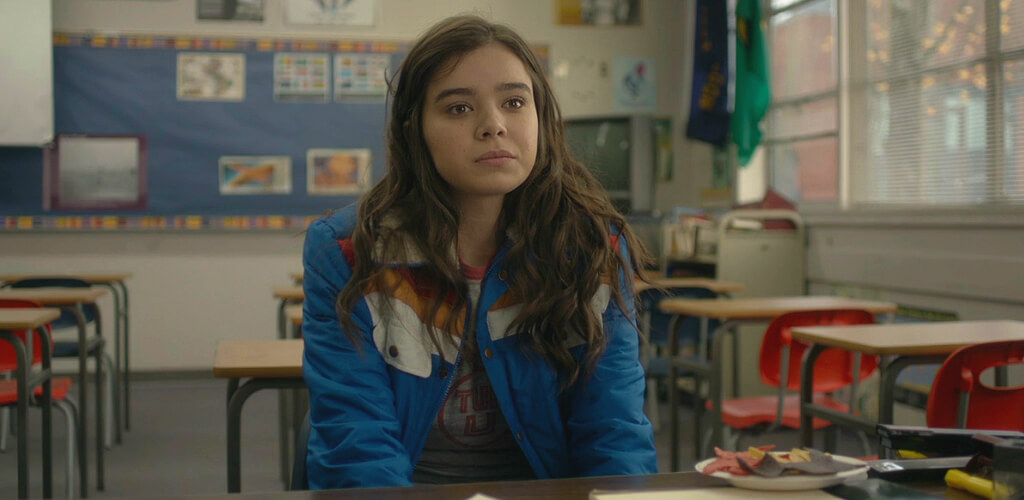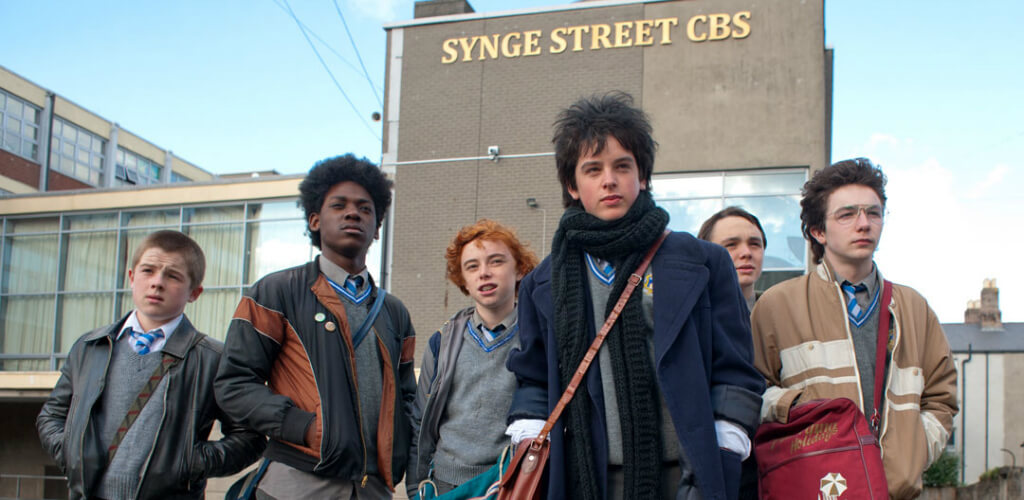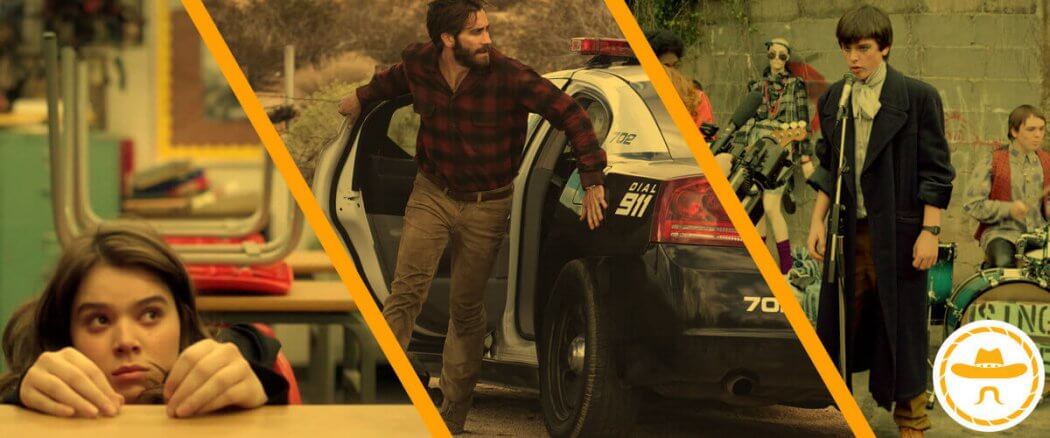At Cinema Faith, we wish we could provide feature-length reviews for every movie that hits theaters. Unfortunately, some films fall through the cracks. Welcome to another edition of Mini-Review Roundup where we present smaller reviews of several movies at once.
This month we review The Edge of Seventeen, Sing Street, and Nocturnal Animals.
The Edge of Seventeen

I wish I could go back to high school with the knowledge I have now. Maybe I would actually talk to people instead of cowering in the corner to play Tetris on my graphing calculator. The problem is we don’t get that option. We experience high school at our most vulnerable stage of existence, when our hormones are the only thing more powerful than our insecurities.
Nadine knows a thing or two about insecurities. She thinks she bears a disturbing resemblance to Pedro from Napoleon Dynamite, and her only friend is in love with her brother. Hailee Steinfeld is a force of nature in the main role. Who knew the girl from True Grit would grow up to deliver sassy, foul-mouthed one-liners with the best of them? But The Edge of Seventeen isn’t your average teen movie. All the tropes are present, but this time they ring true.
Seventeen isn’t about plot points or artificial dilemmas. The plot is a tool to get the ball rolling. The dilemma is being seventeen. This is a movie about wanting to be on your own while living under your parent’s roof; holding onto childhood while the pressures of adulthood near; obsessing over the one unattainable person while the perfect match is there all along. Steinfeld captures these emotions with scorching honesty. She’s funny, charming, erratic, and pathetic. She’s the teenager we all were once (and often still are).
The adults in Seventeen aren’t cookie cutter models of responsibility. They’re just as lost as Nadine at times, but without her transparency. Special mention goes to Woody Harrelson as Mr. Bruner, Nadine’s history teacher. He’d get fired in a heartbeat if the kids were stupid enough to tell on him, but then they’d be losing the only teacher who speaks their language and the only adult they actually trust. It’s the perfect role for Harrelson — utilizing his trademark snarkiness, while also revealing a sweet side we don’t normally see.
Seventeen struggles to find a consistent tone, and the tidy ending feels like betrayal, but it’s still one of the best films of the year. Steinfeld is the linchpin. If the Best Actress race wasn’t so packed, she’d be up for an Oscar. Nadine hits close to home for all of us who spent high school wishing we could be like the cool kids. But maybe that’s the dirty little secret. There are no cool kids in high school — just variably skilled fakers wishing for any life but their own.
Grade: B+
Sing Street

Musicals are only as good as their songs, which is how Sing Street strummed its way into my top 10 of 2016. The film isn’t a musical in the traditional sense of the word — characters don’t break into spontaneous song and dance — but it is a musical in the truest sense of the word. This is a film that honors the power of songs to transport us, unite us, and lead us to the truth we need to hear.
Writer/director John Carney has pulled off this trick before. His Oscar-winning Once was the feel-good movie of 2007. Once had a more intimate relationship at the center than Sing Street, but the latter could be the better film. The songs feel more natural here. There is still an abundance of full-length tunes, but they don’t stick out like most musicals, and the coming-of-age plot gives them added weight.
Music is 15-year-old Conor’s lifeline. His parents are on the verge of divorce, and he’s been transferred to a Catholic school where the teachers turn a blind eye to bullying and the headmaster is a predator disguised as a priest. Every adult in Conor’s life has let him down, but he finds hope among his peers. On a whim to impress a girl, he starts a band. They’re scrappy, but talented. Music gives Conor the outlet to process his circumstances, and the confidence to rise above them.
Sing Street is set in the 80’s which sets the tone for the music. Every song in the movie is memorable. I dare you not to download the soundtrack. But the music also has a lived-in authenticity. We see the songs grow from tiny kernels to full-blown arrangements in real-time, and we experience the events in Conor’s life that inspire them. Ferdia Walsh-Peelo gives a terrific performance as Conor. That’s really him singing the songs in the movie, and he plays a three-dimensional character to boot. The performance feels like the early years of a now-famous musician, still unsure of who he is and clueless about where he’s going.
Sing Street isn’t just for music freaks though. This is a movie for everyone. As Conor’s brother (Jack Reynor, who nearly walks away with the movie) says, “Anything can be a vocation.” The film is ultimately about the joy of creation. God formed the universe out of nothing and handed it to us. We are co-creators with the divine. There’s a moment toward the end of the film where Conor sings a song and imagines everyone in his life dancing to it, free from their problems and inhibitions. That’s the power of good art — we see the world as it should be, if only for a moment.
Sing Street reminds us that we are all composers of songs through the choices we make and the measure of our love. How does your music sound?
Grade: A-
Nocturnal Animals

Nocturnal Animals is a strange movie, and most people will hate it. The film opens with a credit sequence of obese women dancing nude as displays of American patriotism explode behind them. What does this mean? I don’t know, but I have theories. Yes, this is that kind of a movie. The plot is easy to follow, but meanings are elusive. This is a dense, foggy journey through the darkest recesses of human nature.
Nocturnal Animals gives us two stories for the price of one. The first is set in the sterile world of the upper class. Amy Adams plays Susan, an art gallery owner who’s lost in a crumbling marriage and a mansion. She receives a book from her ex-husband called “Nocturnal Animals” which becomes the second story as Susan reads it and we see the narrative of the novel unfold. Jake Gyllenhaal plays Tony in the latter story, a simple man taking his family on a road trip through Texas who bumps into a band of hooligans that terrorize them and kidnap his wife and daughter.
The contrast between the two stories is stark. The world of the novel is old-fashioned and primal; Susan’s is stuffy and aimless. There’s no question which one is more exciting, and we can’t help but sigh every time we’re taken from Tony’s gut-wrenching plight to Susan staring off into space. But the two stories bear more resemblance to each other than initially meets the eye.
The acting is good across the board, but only Gyllenhaal approaches great. It’s interesting seeing Adams shed her usual persona, but she doesn’t have enough to do. Gyllenhaal gets all of the high notes, and he makes the most of them. As Tony tracks down his family and the tale turns darker, we see a man stripped of life and desperate for revenge. Tony stares evil in the eye. How will he respond? How would we? Loving your enemies sounds nice until you’re looking at them.
And therein lies the point of Nocturnal Animals. The novel Susan reads crashes through her insulated life because it’s a story that infuriates all of us — wicked people harming innocent people and not caring about what gets left behind. Many will call the final scene of the film a non-ending, but that’s the moment when everything clicked into place for me. That’s when I realized that Nocturnal Animals is a modern-day version of the prophet Nathan rebuking David in 2 Samuel with the story of a man and his ewe lamb. None of us want to be on the receiving end of that story, and we’re quick to shift the blame. Writer/director Tom Ford is clearly taking aim at the 1%, but in America we’re all the 1% compared to the rest of the world, and we kill people every day with our indifference.
Nocturnal Animals is a difficult film to appreciate. The tone is choppy, ping-ponging between two completely different aesthetics, and the experience is violent and brutal. But the movie’s power sneaks up on you, and it’s unlike anything else released in 2016. Maybe we need a black mirror held up to our lives at times. Maybe Ford is a prophet Nathan to all of us, telling a story to our hard hearts so that we’ll finally wake up.
Grade: B+





